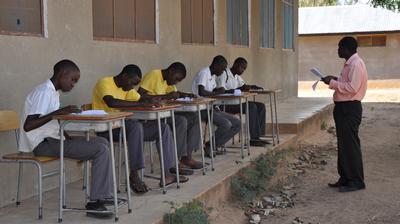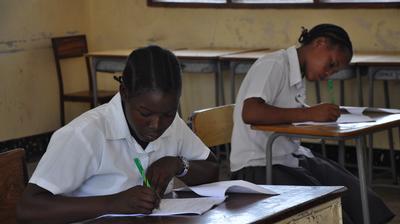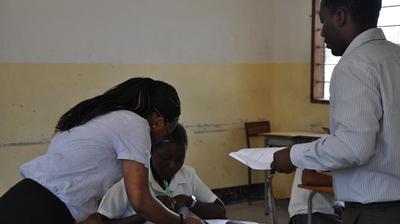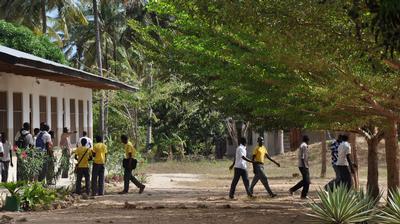Here come the girls: Empowering young Tanzanian women
For the past few weeks, a team of Norwegian and Tanzanian researchers and research assistants have been travelling all over Tanzania to distribute a survey and collect data about 4000 Tanzanian girls on the verge of adulthood. The girls’ answers will reveal important knowledge on the close links between Tanzanian girls’ self-determination and sexual life, and economic empowerment.
Investigating impact
The “Girls’ economic empowerment – the best contraceptive?” project is a research project aimed at gaining a better understanding of the lives of young women in rural Tanzania, with an ambition of informing sound policy. The project is a collaboration between the Chr. Michelsen Institute (CMI), the Choice Lab at the Norwegian School of Economics (NHH), the Tanzanian research institute Economic and Social Research Foundation (ESRF), the CSO Femina HIP and Development Pioneer Consultants.
Through a comprehensive survey, the researchers map young women’s attitudes, hopes and beliefs regarding family and livelihood. The project is designed as a field experiment. The girls participating in the study are divided into four groups, of which one group receives training in sexual and reproductive health, one receives training in entrepreneurship, one receives both training programmes, and a control group does not receive any training. The students who participate do not know that they are part of a field experiment.
Comparing the attitudes and experiences of the different groups at different stages will provide important information on the effect of training programmes. This information is crucial for the CSO’s training programmes, as well as Tanzanian authorities, who are trying to reduce school drop-out. The current survey is the second round of the mapping process. Next year, the researchers will do a follow-up study to see what happened to the girls who participated in the study.
-Many researchers conduct projects on sexual and reproductive health, and many do projects on entrepreneurship, but very few combine the two. We believe that many young women cannot embrace economic opportunities because family constraints and household chores fully absorb their time and energy. At the same time, poor economic prospects make early childbearing an attractive strategy. Our design allows us to find out whether programmes on sexual and reproductive health and economic entrepreneurship are more effective in changing attitudes and behaviour when they are combined, says Vincent Somville, senior researcher at CMI.
Femina HIP has been involved in all stages of the project. They developed the two booklets used in the training of the girls, trained the teachers and communicated with the authorities and stakeholders. They are very eager to know more about the effects of the Girl Power training programmes, as this will inform the development of their own outreach programme; a national network of more than 600 Fema Clubs, for which they create a variety of media products. The Fema Clubs are organized as extracurricular activities in secondary schools where students get together on a weekly basis, discussing issues related to rights and gender, building skills in decision making and critical thinking, while learning to negotiate attitudes and power relations. The main objective is to stimulate youth to become active change makers in their communities.
-It is a privilege for us to be part of this research project because it allows us to explore issues surrounding girl’s empowerment, which is very relevant for our agenda and activities. We hope that the girls who have participated in the training feel an increased sense of confidence and agency. The findings from the research project will help us rethink how we work with our extensive Fema Club programme. All over Tanzania, Fema Clubs have been created and are run by either young people themselves or teachers in secondary schools. This in itself is a testimony to the importance of the clubs, says Karen Thulstrup, adviser at Femina HIP.
“You need three stones for cooking”
When Form 4 girls from 80 secondary schools are asked sensitive questions about boyfriends, sexual habits and condoms, you would expect a few giggles in the classrooms. But for the girls taking part in the survey, sex, relationships and economic independence is no laughing matter.
Femina HIP’s agenda is aimed at empowering girls who are often seen as having less control over their lives than their male peers. Dependency on several men for money or commodities is part of the everyday survival strategy for many young Tanzanian girls illustrated by the Southern Tanzanian proverb “You need three stones for cooking”, referring to how most Tanzanian women cook using a pot balanced on three stones over a fire. This survival strategy – having multiple partners - has been one of the drivers of HIV in Tanzania according to Karen Thulstrup from Femina HIP.
-The link between sexual and reproductive health and economic empowerment is very explicit. Transactional sex, to get money or commodities for sex, is common. If young women make money of their own, they will be in a better position to say no, or to negotiate safe sex, hence more in control of their sexual and reproductive health, says Thulstrup.
-Although sexual habits and transactional sex is not publicly discussed in Tanzania, young girls and boys talk about it with their peers, says Dorica Andrew, research assistant at DPC.
Participation and voice is key to empowerment. Femina HIP involves young people in the development of their media products and engages young people in conversation via SMS and social media on a regular basis. Still, changing attitudes and empowering girls is not necessarily an easy task.
-In some regions, people call it a miracle if girls reach Form 4 in school. Part of the explanation is culture and the value that is placed on education, but it is also a matter of how the local authorities handle school drop out, says Andrew.
She thinks that training programmes can be an important contribution, and that participating will have an impact.
-The feedback we get from school teachers is that training programmes are an eye-opener. The girls who participate are inspired and see possibilities rather than obstacles, she says.
Juda Lyamai, research coordinator for the “Girls’ economic empowerment” project, agrees.
-You cannot change peoples’ mind over night, but if we use the output from this project and continue working through training programmes, workshops and policymakers, we will get somewhere. More than 6000 girls this age got pregnant and dropped out of school in 2010, according to statistics from the Tanzanian Ministry of Education. These girls lack strategies that can help them get through. If we succeed, this project will be part of solving a big problem in our local communities, he says.





Publications
Business training in Tanzania: From research-driven experiment to local implementation

